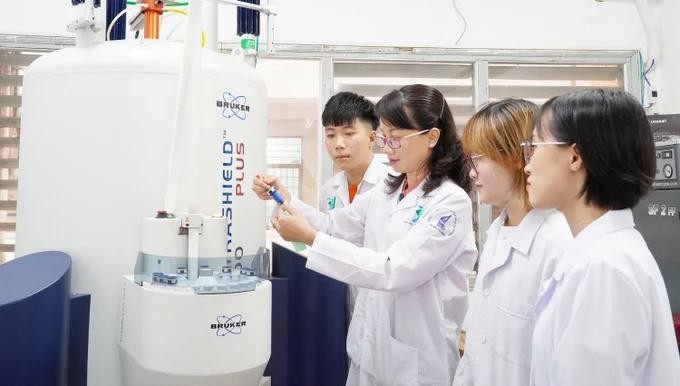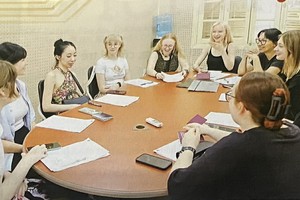
Science, technology and innovation developments will help turn Vietnam into a developing country with modern industry, self-reliance and technological competitiveness in key areas which the country has potential and advantages.
To achieve this goal, the problem of high-tech human resources is a key issue, which is being actively implemented by higher education institutions.
According to economist Andrea Coppola of the World Bank in Vietnam, one of the challenges that Vietnam must overcome to achieve the goal of becoming a high-income country by 2045 is human resources. Realizing this, in 2022, the Prime Minister hence issued Decision 569/QD-TTg on the Strategy for Science, Technology and Innovation Development to 2030, with the goal of training about 15,000 microchip design engineers from now to 2030.
The achievement of this aim is both demanding and advantageous for Vietnam, provided that the government makes substantial investments and simultaneously enhances collaboration with enterprises to advance training, research and development, and broaden the scope of STEM instruction (including science, engineering, technology, and mathematics). In particular, Vietnam needs a sustainable and long-term commitment, because building this human resource requires a stable and significant supply from undergraduate, postgraduate and practical training.
According to Associate Professor Vu Hai Quan, Director of the Vietnam National University (VNU) Ho Chi Minh City, VNU Ho Chi Minh City is a university system with 8 universities, 1 member research institute, with the largest training scale in the country with about 100,000 undergraduate and graduate students. He revealed that VNU Ho Chi Minh City has a vision to become a top research university system in Asia by 2045, a place where talents converge and spread Vietnamese knowledge and culture. On that basis, VNU Ho Chi Minh City always considers cooperation with businesses as one of the important activities to increase resources, contributing to the successful implementation of the development strategy. In particular, in the development strategy for the period 2021-2030, VNU Ho Chi Minh City has identified 3 key areas of training and research for the fields of Semiconductor Technology, Biotechnology, and Artificial Intelligence.
Professor Hsi-Pin Ma, Director of the Microchip Design Technology Center, National Tsinghua University (Taiwan), shared that being a global leader in microchip and semiconductor technology, Taiwan (China) currently has a Microchip Development Association to support cooperation in developing microchip technology. This support is linked to universities as well as businesses to develop human resources. Students are taught and practiced at chip manufacturing enterprises. This is considered the output standard for microchip technology engineers. Along with that, the government provides financial support, educational agencies mobilize experts and businesses to participate in designing and building standard training programs for the microchip technology industry.
Meanwhile, Consul General Shin Choong-il of the Republic of Korea in Ho Chi Minh City said that the semiconductor industry, digital transformation, artificial intelligence, smart systems and eco-friendly issues will become the pillars of the world's future industries. Human resources are the greatest assets for the future of countries. In June 2023, the President of the Republic of Korea visited Vietnam, sending a message of support for investment in high-tech industries and high-tech human resources in Vietnam. This message was reinforced during Prime Minister Pham Minh Chinh's visit to Korea in July 2023.
Meanwhile, US Consul General in Ho Chi Minh City Susan Burns said in September 2023, when visiting Vietnam, President Joe Biden signed a memorandum of understanding on cooperation on developing supply chains, human resources, and the semiconductor technology ecosystem in Vietnam. At the same time, through the support and cooperation program between the United States Agency for International Development (USAID) and VNU-HCM and other Vietnamese universities, the United States will continue to improve human resource capacity to meet the requirements of the new economy.
Managing Director of Intel Vietnam Kenneth Tse informed that Intel Vietnam is the largest chip assembly, testing and packaging factory today. Therefore, human resources for Intel are a matter of survival. From 2010-2016, Intel has built a scholarship program and trained about 9,000 Vietnamese engineers who are currently working at the factory. In the coming period, Intel hopes to continue to expand cooperation with Vietnamese universities to participate in supporting scholarships and training semiconductor chip human resources.
Business Director of Synopsys South Asia Company Trinh Thanh Lam said that in March 2024, Synopsys Vietnam signed a cooperation agreement with Ho Chi Minh City National University on human resource development for the field of microchip design and semiconductor technology. In Vietnam, there are currently more than 600 Vietnamese engineers working for the company. In the development strategy for the coming time, Synopsys Company will open another center in Ho Chi Minh City and need more engineers and experts in microchip and semiconductor technology.
Along with that, Synopsys Company hopes to cooperate with universities to grant scholarships, select excellent students to undergo internship programs at Synopsys, and then recruit engineers through this program.
























